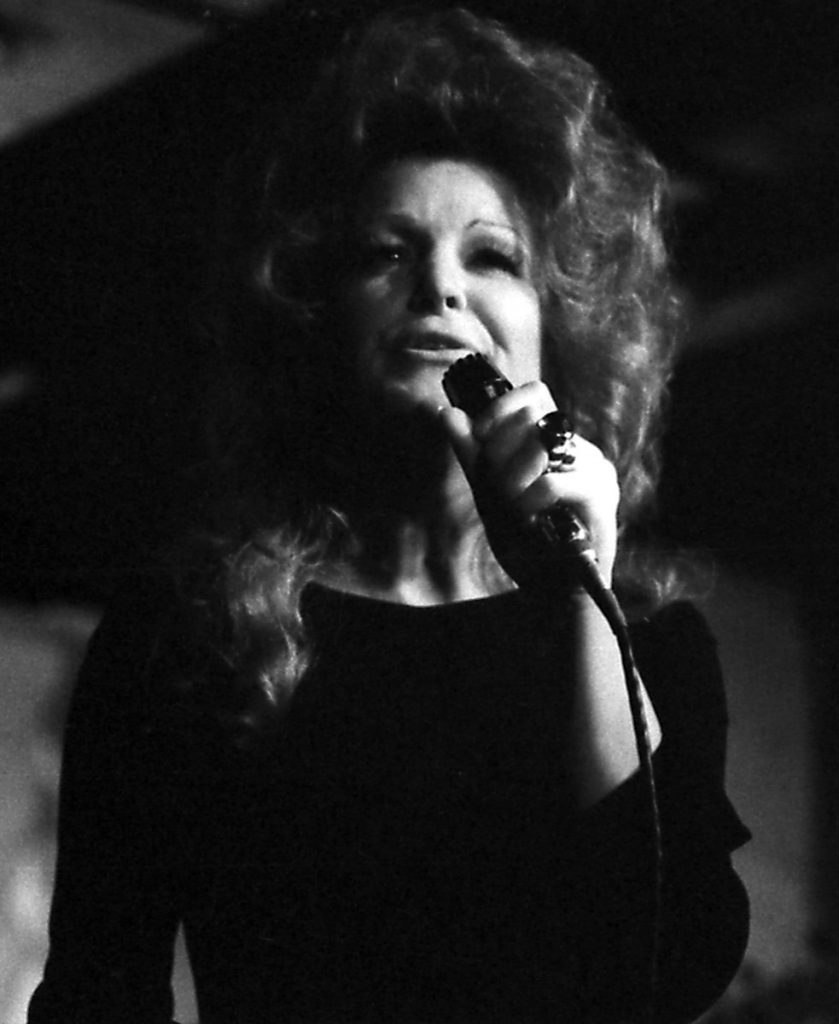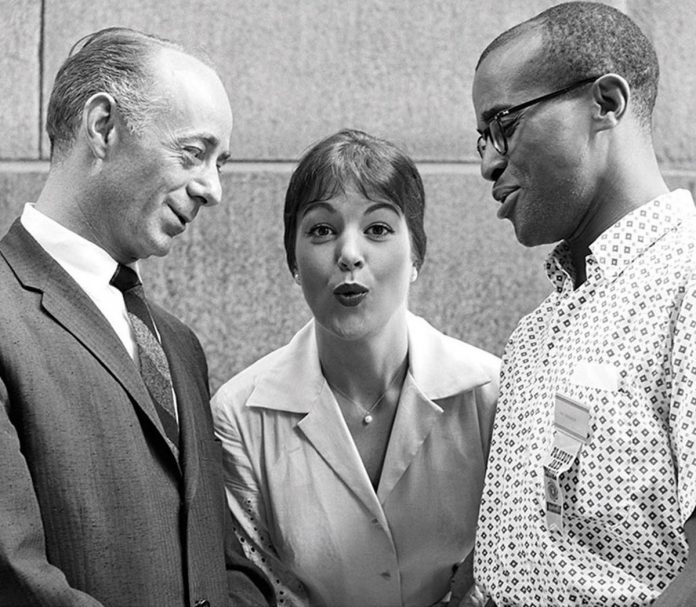Born into show business, Annie Ross had a long career with extraordinary highs and dark lows that saw her perform and excel in many areas. She was born Annabelle McCauley Allan Short, 25 July 1930, in Mitcham, Surrey, England. Her parents, John “Jack” and May Dalziel Short were Scottish music hall entertainers and her brother, under the name Jimmy Logan, became a popular comedian on stage and television.
She appeared on stage at the age of three and a year later went with her family to America. In New York, she was successful on a children’s radio show overseen by bandleader Paul Whiteman. Shortly after this, Annie’s parents and brother returned to the UK and she, accompanied by her aunt, the singer and actress Ella Logan, moved to Los Angeles. Building on her radio success, which brought her a six-month contract with MGM, she began an acting career in films under the name Annabelle Logan.
Her first film was the comedy short, Our Gang Follies Of 1938, in which she sang Loch Lomond. She then sang in another short, the 1940 Cinderella’s Feller, and in 1943 took the role of Judy Garland’s sister in Presenting Lily Mars. The following year, while attending Hawthorne School (originally Beverly Hills Grammar School), at which a schoolmate was Elizabeth Taylor, she entered a contest in which she sang Let’s Fly, a song she had composed and which would be recorded in 1949 by Johnny Mercer & The Pied Pipers.
Leaving school in 1947, by now using the name Annie Ross and determined on a career as a singer, she left America and began working in the UK and Europe. Among musicians with whom she worked in the UK were Tony Crombie and Jack Parnell, and while in Europe she sang in Hugh Martin’s vocal group. She also met and had a brief affair with the US expatriate jazz drummer Kenny Clarke. They had a son, Kenny Clarke Jr, with whom they returned to America. Given their working environment, mainly in nightclubs, it was decided that their son would be raised by Clarke’s brother and sister-in-law.
Although she recorded for Dee Gee Records (co-owned by Dizzy Gillespie and Dave Usher), Ross was unhappy with the state of her career, and in the early 1950s crossed the Atlantic again, intent on developing her European audience and appeared in London in Cranks. Unknown to her, however, a project she had undertaken for Prestige Records producer Bob Weinstock had taken off in America. This was a lyric she had written to retrace the notes of an improvised jazz solo by tenor saxophonist Wardell Gray. Entitled Twisted (which she reputedly dashed off overnight), it proved to be a significant milestone in her career and also became an anthem of vocalese.
Following on from this came offers of club work and recognition by Downbeat magazine. For the next few years, she worked extensively, mainly in America, playing clubs and concerts and sharing bills and sometimes recording with leading jazz musicians, including Count Basie, Dizzy Gillespie, Lionel Hampton, Gerry Mulligan, Charlie Parker and Zoot Sims. She also formed friendships with Billie Holiday and Lenny Bruce.
In 1958, she teamed up with fellow singers Jon Hendricks and Dave Lambert, their trio being one of the highlights of her career. Live and on record, they attracted audiences and topped polls. The first of the albums recorded by Lambert, Hendricks & Ross was Sing A Song Of Basie, and among others were The Hottest New Group in Jazz, 1959, Sing Ellington and High Flying.
She married actor Sean Lynch and together they opened a jazz club in London, but although Annie’s Room featured major artists it failed, leaving the couple with crippling debts from which they never recovered, neither financially nor personally. In 1975, they divorced and she was declared bankrupt
Sadly, this period of Ross’s life also had a dark side. Following the example of several of the artists with whom she worked and played, among them Bruce, with whom she had a close personal relationship, Ross had begun using hard drugs and sometimes she failed to make engagements and Carol Sloane had to step in. Then, in the early 1960s, Ross overdosed with heroin but was pulled back from the brink (reportedly saved by Bruce, who was also an addict).
At the end of a visit to London in 1962 with the L, H & R trio, she opted to stay behind and kick her habit. The following year, she married actor Sean Lynch and together they opened a jazz club in London, but although Annie’s Room featured major artists it failed, leaving the couple with crippling debts from which they never recovered, neither financially nor personally. In 1975, they divorced and she was declared bankrupt.

Despite this, showing her often remarkable resilience, Ross had returned to acting. In the 1970s, she appeared in small roles in theatrical productions of The Threepenny Opera, The Seven Deadly Sins, Side By Side By Sondheim, and The Pirates Of Penzance, the last named produced by Joe Papp in 1982. Her acting work and her friendship with the wife of film director Robert Altman led to him casting her in the early 1990s films The Player and Short Cuts, in which she played the role of a troubled jazz singer, and In Carver Country. Among other films in which she had small roles are Straight On Till Morning (1972), Yanks (1979), Funny Money (1982), Superman III (1983), Throw Momma From The Train (1987), Witchery (1988), and The Progeny (1992). Behind the scenes in films, Ross dubbed the speaking voice for Britt Ekland in The Wicker Man (1973) and the singing voice for Ingrid Thulin in Salon Kitty (1976).
Somehow, she managed to find the time to write a cookbook, Come On In, which was published in 1972. She also continued to sing and in the early 1980s teamed up with pop singer-pianist (and jazz fan) Georgie Fame, touring the UK and recording an album, In Hoagland ’81. In the 1990s, she joined forces with Jon Hendricks to reprise the earlier popularity of their trio (Dave Lambert had died in 1966), and they continued to make occasional appearances until Hendricks’ death in 2017.
During her final years, Ross, who had become a United States citizen in 2001, was recognised in many ways. In 2006, a one-woman play, Twisted: The Annie Ross Story, by Brian McGeachan, was staged at The Space Theatre in London. In 2009, she was inducted into the ASCAP Jazz Wall of Fame, the following year it was the National Endowment for the Arts Jazz Masters’ Award, and in 2011 the MAC Award for Lifetime Achievement. In 2012, she was the subject of Brian Ross’s film documentary, Annie Ross: No One But Me. She had continued to record, including the 1996 Music Is Forever, with Tommy Flanagan, 2007’s Live In London, with Peter King, and then in 2014 came the release of her final album, To Lady With Love, a moving tribute to Billie Holiday.
An extraordinarily gifted artist, Annie Ross died from emphysema and heart disease at her Manhattan home on 21 July 2020. She is survived by her partner of 30 years, Dave Usher, her sister, Heather Logan and her nephew, Domenick Allen. Her son, Kenny Clarke Jr., predeceased his mother in 2018.

